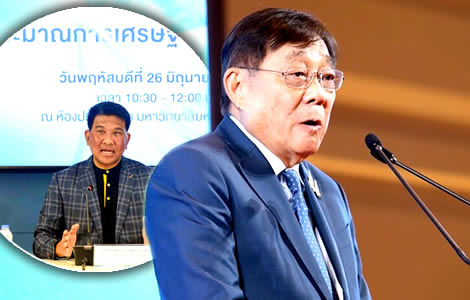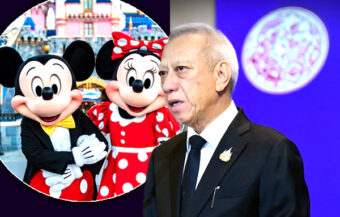Finance Minister shoots down 18% tariff deal with U.S., says talks still ongoing. Thailand pushes to keep 10% rate as July 9 deadline looms. UTCC slashes 2025 GDP forecast to 1.7% amid trade tensions, weak investment and rising political uncertainty.
Thailand’s Finance Minister on Thursday shot down reports of a done deal with the U.S. on an 18% tariff for Thai exports. He clarified the figure was only a planning assumption, not a settled agreement. Officials say Thailand is now pushing hard to extend the current tariff suspension beyond the looming July 9 deadline. Negotiators remain firm on their target: keeping the existing 10% baseline rate. The denial comes as economic storm clouds gather. The University of the Thai Chamber of Commerce (UTCC) just slashed its 2025 GDP forecast to a bleak 1.7%, citing mounting risks at home and abroad at this time.

Thailand’s Finance Minister, Pichai Chunhavajira, has rejected claims that the government has accepted a proposed 18% U.S. import tariff rate. Speaking Thursday, the minister clarified that no final agreement has been reached in ongoing trade negotiations with the United States.
The denial came amid speculation in Thai media and online platforms. Pichai posted on Facebook that the 18% figure is not an official number. It is instead an estimate used by economists and the Bank of Thailand (BOT) for scenario planning. He emphasized that negotiations are still underway and remain unresolved.
Thailand insists no final tariff deal as 18% rate cited by BOT was only for planning, not a policy decision
Talks with the United States Trade Representative (USTR) are ongoing. Thailand has submitted a detailed proposal. Officials are now waiting to hear whether the U.S. will extend the 90-day negotiation period, which expires on July 9. According to Pichai, Thailand submitted its proposal only recently, and a follow-up meeting date has not yet been set.
Reports from Washington suggest the U.S. side has floated a tariff in the range of 20% to 25% on Thai exports. Significantly, this would leave Thailand on par with the reported rate for Vietnam, its arch-competitor.
Thailand, however, is pushing to retain the current 10% rate. Pending a final deal, the government is seeking a temporary three-month extension of the 10% tariff rate beyond July 9.
The uncertainty surrounding these trade discussions is contributing to rising concerns over Thailand’s economic performance in 2025.
On Thursday, the Economic and Business Forecasting Center at the University of the Thai Chamber of Commerce (UTCC) sharply lowered its GDP growth projection. The centre now expects Thailand’s economy to expand by just 1.7% this year, down from a previous forecast of 3.0%.
Thailand seeks extension of 10% tariff rate while UTCC slashes GDP growth forecast down to just 1.7%
The revised outlook reflects multiple risk factors. These include the unresolved U.S.-Thailand trade dispute, the conflict between Israel and Iran, and rising political tensions at home. Tensions along the Thai-Cambodian border are also contributing to investor unease.
The UTCC noted that domestic economic activity is weakening. Private investment has contracted for four consecutive quarters. It is projected to decline by 1.2% in 2025, underlining persistent structural problems and weak investor confidence.
The industrial sector is also struggling. Thailand’s manufacturing capacity utilization stands at just 65.1%. Production is lagging behind even sluggish export growth. Private consumption has slowed, rising only 2.4% year-on-year. This is due in part to high household debt, which remains at 87.4% of GDP. The burden is suppressing consumer spending and dampening domestic demand.
Tourism, once a key economic pillar, continues to recover slowly. Chinese tourist arrivals remain at only 40.3% of pre-pandemic levels. Security concerns and rising regional competition are partly to blame. The total number of foreign visitors in 2025 is now expected to reach just 36 million, down from earlier projections.
Domestic weakness and global conflict compound Thai economy’s woes, with tourism and exports both lagging
The Thai government has replaced its earlier cash-handout scheme with a ฿157 billion stimulus program. According to the UTCC, this initiative has a higher fiscal multiplier—1.3 times—but its success depends heavily on how quickly the funds are disbursed. The centre’s forecast assumes that only 50% of the stimulus package will be disbursed this year.
UTCC economists have modelled a range of growth scenarios. Under the baseline, where tariffs rise to 15–20% and the government disburses half of the stimulus funds, GDP growth will likely remain around 1.7%.
In more adverse conditions—including protracted political turmoil or unresolved border conflicts—growth could drop as low as 0.9%. In a best-case scenario, with stable politics and faster disbursement of funds, growth could reach 2.3%.
Dr. Thanawat Polvichai, President of the University of the Thai Chamber of Commerce and Chairman of its Economic and Business Forecasting Center, emphasized the impact of political stability on economic performance. He noted that if the government can disburse 70% of the stimulus budget and maintain political order, there is potential for a stronger economic outcome.
Growth hinges on stimulus rollout and political calm as UTCC models scenarios from 0.9% to 2.3% GDP growth
He also pointed to a critical date: July 1. On that day, Thailand’s Constitutional Court is expected to decide whether to accept a petition regarding an audio recording allegedly implicating Prime Minister Paethongtarn Shinawatra. If the court accepts the case, the prime minister may be ordered to temporarily step down, which could further destabilize the political landscape.
While the Bank of Thailand recently raised its own GDP forecast to 2.3%, this is based on more optimistic assumptions about recovery. The central bank has yet to lower interest rates, but UTCC expects the Monetary Policy Committee (MPC) to make two rate cuts in the second half of the year, bringing the policy rate down to 1.25%.
PM Paetongtarn hoping to get a fillip from US-Thai trade talks as she battles for political survival against arch foes
Crucial test for Prime Minister Paetongtarn on Saturday as the Yellow Shirts take to Bangkok’s streets
Finance Minister is banking on a U.S. extension of the reciprocal tariff suspension expiring on July 9
The economic challenges Thailand faces are complex and interconnected. The U.S. trade dispute is just one of several issues weighing on business confidence and growth. The UTCC urges the government to accelerate trade negotiations, improve clarity around fiscal policy and support vulnerable economic sectors.
In particular, it recommends urgent action on household debt, investment stimulation and structural reform in the industrial sector. The centre stresses that improving the resilience of Thailand’s economic system is essential in the face of global and domestic uncertainty.
Join the Thai News forum, follow Thai Examiner on Facebook here
Receive all our stories as they come out on Telegram here
Follow Thai Examiner here
Further reading:
Prime Minister Paetongtarn pulls her government back from the brink with emotional televised apology
Government on brink of collapse as the Bhumjaithai withdraws from Paetongtarn’s cabinet over clip


















